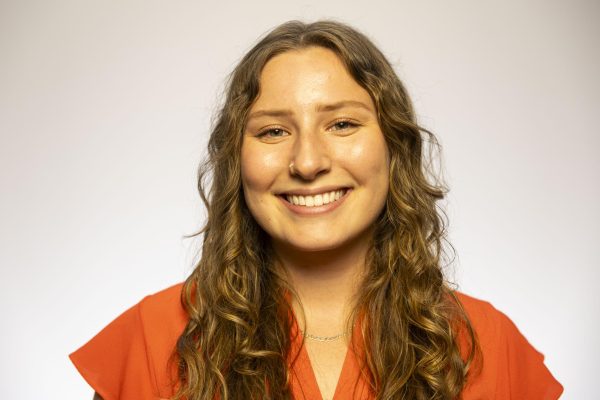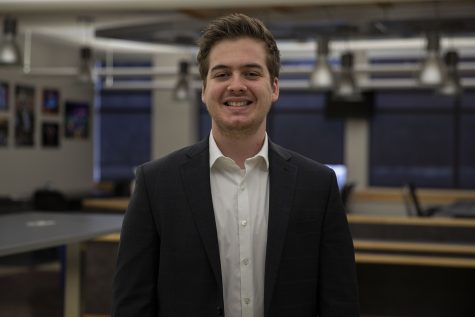Most UI students feel they belong on campus, sense of belonging lower for underrepresented groups
Nearly 80 percent of undergraduate students said they feel they belong on campus, but that number was lower for nonwhite students and other underrepresented groups.
The Old Capitol building is seen on March, 6, 2021.
March 24, 2022
While nearly 80 percent of undergraduate students said they felt they belong at the University of Iowa, that proportion is smaller for underrepresented groups, according to a campus climate survey released Thursday.
According to the survey, conducted by the Division of Diversity, Equity, and Inclusion, 79 percent of undergraduate students said they feel they belong at the University of Iowa.
Broken down by race and nationality, the number of students who agreed they felt they belong on campus are:
- 76 percent of underrepresented minority students
- 74 percent of Asian students
- 80 percent of white students
- 85 percent of international students
- 73 percent of multiracial students
The underrepresented minority classification includes Native American and Alaska Native, Native Hawaiian or other Pacific Islander, Black, and Hispanic or Latino students. The categories were combined because of small sample sizes, the report said.
For undergraduates by gender, transgender and gender-nonconforming students had the lowest feeling of belonging, at 61 percent. For cisgender men, 77 percent of students felt they belonged, compared with 81 percent of cisgender women.
The undergraduate survey was taken by 3,884 students, for a participation rate of about 19 percent. For graduates and professional students, the participation rate was 28 percent and 36 percent, respectively.
In the 2018 campus climate survey with the same question, 86 percent of undergraduate students said they feel they belonged at the UI.
For graduate students in the 2021 survey, 89 percent said they felt they belong in their graduate program.
By race and nationality, those numbers are:
- 81 percent of underrepresented minority students
- 84 percent of Asian students
- 91 percent of white students
- 88 percent of international students
- 91 percent of multiracial students
Feelings of belonging were even higher among professional students, with 95 percent saying they felt they belong in their program.
Students’ feeling of belonging did not vary much based on political orientation, but conservative students were more likely to report that they felt their political beliefs were not respected on campus.
Forty-four percent of conservative students agreed that their political beliefs are respected at the UI, compared with 88 percent of moderates and 96 percent of liberal students. For graduate students, those results were 50 percent for conservatives, 83 percent for moderates, and 97 percent for liberals.
This is the latest campus climate survey to be released since the faculty climate survey was released in 2021, which showed similar differences between underrepresented groups on campus.
Data visualization by Kelsey Harrell/The Daily Iowan
Faculty interactions
In general, 78 percent of undergraduate students said their instructors were available when they needed them, but less than half of undergraduate students said they had worked with a faculty or staff member they thought of as a mentor.
Only 43 percent of undergraduate students said they had a faculty or staff member they considered a mentor. Broken down by race, those numbers are:
- 48 percent of underrepresented minority students
- 35 percent of Asian students
- 43 percent of white students
- 41 percent of international students
- 48 percent of multiracial students
Recommendations
The report says that the DEI Office’s staff plans to build inclusive program climates on campus and implement training sessions for faculty and staff.
Liz Tovar, executive officer and associate vice president of the Division of Diversity, Equity, and Inclusion, said at a press availability on Thursday that the UI wants to enhance communication between students, faculty, and university administration.
Tovar said that the UI plans to take the survey results to open the discussion on how students feel on campus.
“I think that that’s our goal,” she said. “That’s our outcome from all of this is that as I gave you that example, you know, when we look at these surveys, you know, our next step is going to be kind of taking this to more of a ground level and really talking to people about the why.”
She said the UI realizes that while some students are set up to thrive on campus, other experiences on campus may cause harm.
“It’s important to address these experiences directly,” she said. “We want people to know that we take that very seriously and not always through punitive action, but rather through dialogue and through discussion.”
Andre Perry, director of arts, engagement, and inclusion and senior advisor to the executive officer, said the next surveys will be sent to staff and students at the same time.
“So we’ll have all the students as well as the faculty, staff, and our postdocs all taking surveys in the upcoming four to eight weeks,” he said.
Editor’s note: A previous version of this story mistakenly said Andre Perry said students and faculty would be taking a climate survey in the next 40 weeks. Perry said four to eight weeks. The story has been updated.
















